#censored but nevertheless
Text
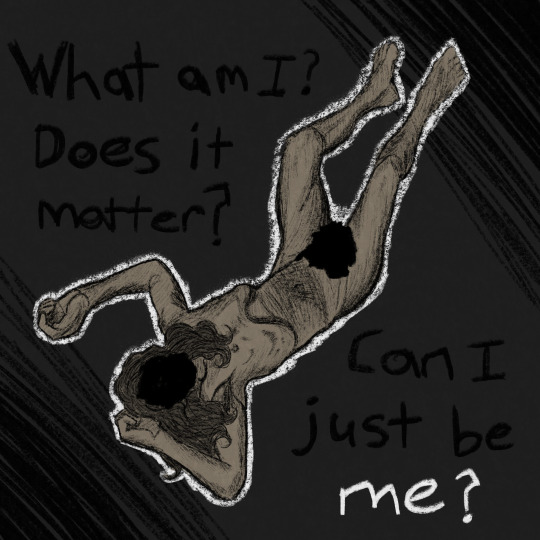
Posting a little something before work. This is my concept for my final for my human anatomy class, I have to do it traditionally but I just wanted to see what it would look like so dbdjdjd but it's cool on its own! Seth can't catch a break, poor bean :(
#my art#oc#seth#agender#tw nudity#censored but nevertheless#let them exist smh#ah shit is this gonna be taken down for having nips?#amab#does that help#they aren't “female presenting” or whatever that used to be#plz let me post my sibbie i love them ;w;
6 notes
·
View notes
Text
BOF (bussinessoffashion.com) mentioned Xiao Zhan in their article about the recent MFW 🤍


#xiao zhan#i wanted to share the non censored one cause people on weibo are not even sharing the title and tagline of the article#cause ya know it’s mildly critical of china#BUT IT IS THE TRUTH WE ALL KNOW IT#nevertheless — XIAO ZHAN KING BEHAVIOR 👑
61 notes
·
View notes
Text
¶
#I've tried to avoid thinking about this for years#but have nevertheless come to a conclusion#I do in fact believe in god#(not capitalised or censored bc I don't mean this in the Abrahamic sense)#but I live my life as an atheist#because I'm angry and refuse to acknowledge them#I simply do not believe they are beneficient and merciful#yet I believe#...#I do not want to believe this#I wish I were truly atheist or joyfully faithful#but alas#but no need for concern#I am not a bitter person#despite everything I believe kindness is the most important thing#because if god will not be there for us#we have to be there for each other#I do realise this is probably the most pointless beleid system#and is in every practical sense atheism#but I do pray or meditate or whatever for what it's worth...#when I say god is uncaring#I do not mean they are malicious#certainly not#I'm just not sure what the value system is (the divine is after all incomprehensible)#not that it would matter anyway#bc I do not believe in a heaven for ''good people'' and hell for ''bad people'' that's frankly ridiculous#but there is an afterlife#more than anything I am convinced of that
8 notes
·
View notes
Text
I’m rebranding the maximum ride kids and I am gonna post everything once I’m done but the mere thought of that fills me with terror like I am not kidding when I say participating in fandom fucked me up
#like do I think these books still have an active fandom??? no#was this the fandom that fucked me up??? no (it was m*rvel)#but am I scared nevertheless??? Yes.#I am not exaggerating when I say fandom culture has made me scared to express joy in response to media#to draw fan art of the things I like#there’s a reason why I censor character names and show names when I reference them in tags lmao
0 notes
Text
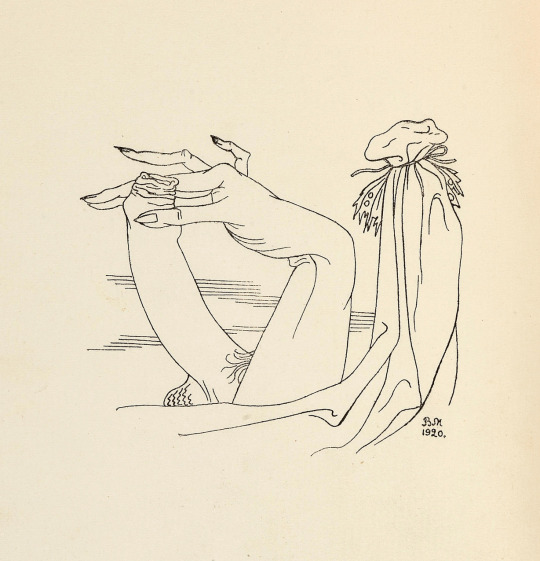
Zanaveshennye kartinki. [Curtained Pictures.] Amsterdam [but Petersburg: Petropolis], 1920.
With illustrations throughout by Milashevski.
THE NONPAREIL OF ILLUSTRATED SOVIET HOMOEROTICA, LIMITED EDITION, one of 307 copies (no 16? erased). When the Soviet censors forbad the book's publication, "Petropolis" followed the practice of French publishers of erotica by providing the false title page with Amsterdam as the place of publication to avoid legal prosecution. Copies were available only to select collectors of erotica who bought the anonymous collection directly from the author. Nevertheless, his name got out and Kuzmin could never entirely shake himself free of the taint of the book's notoriety. Milashevskii, here working in a naughty Beardsleyesque manner appropriate to the content, later became a prolific illustrator of children's books.
Bonham's
60 notes
·
View notes
Text
China 🇨🇳
A Guide to Some of the Best Queer Asian Shows
Full list here.
Most chinese shows are adapted from explicitly queer novels, the shows are undeniably and obviously queer, but nevertheless the queer romance part is censured. The only exception is number 4 on the list, it is not censored.

1. The Untamed
period drama; fantasy
An epic fantasy led by a problem child who comes back from the dead 16 years later in order to fix the broken world he left behind — and finally unite with his soulmate.
YouTube
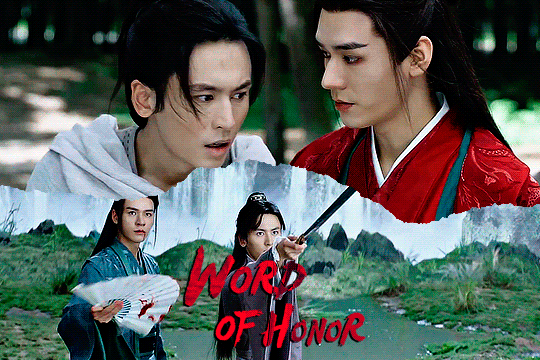
2. Word of Honor
period drama; fantasy
The leader of assassin organisation Zhou Zishu quits his position in pursuit of freedom with drastic measures. In his travels, he meets Wen Kexing, the leader of Ghost Valley who wants nothing but revenge. The two become entangled in various machinations within the martial arts world, and eventually become soulmates instrumental in each other's redemption.
YouTube & Special Episode on Tumblr or DailyMotion
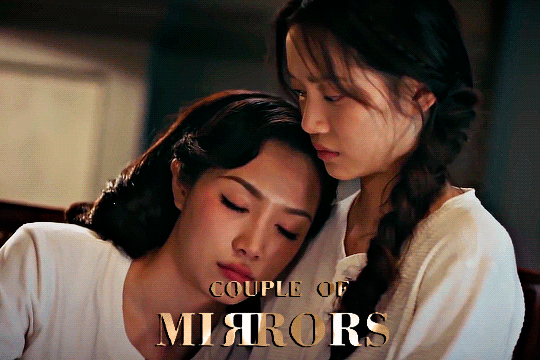
3. Couple of Mirrors
wlw; period drama; socialite/assassin
You Yi is a kind-hearted socialite and a successful author. Her perfect life is turned upside-down when she discovers a betrayal by the two most trusted people in her life. With no one left to turn to, she finds refuge in the friendship and support of Yan Wei, a lonely female killer disguised as the owner of a photo studio.
YouTube. the show doesn’t have a happy ending, but it can be a happy ending for you if you stop watching at episode 12 timestamp 28:02.
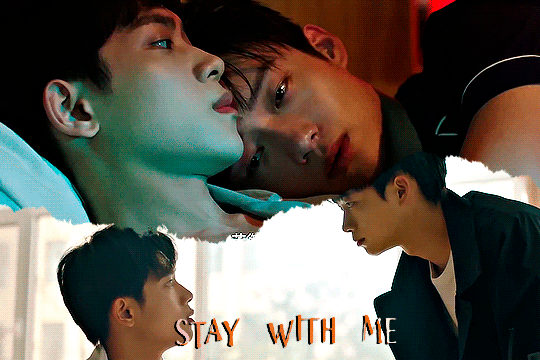
4. Stay With Me
enemies to lovers; high school setting; unconventional families; slow burn
Su Yu is a high school student who lives with his single poor father. Su Yu gets a new classmate Wu Bi. The two clash right from the start, and after getting off on the wrong foot, their explosive relationship takes a turn.
YouTube or GagaOOLala. the show doesn’t have a happy ending, but it can be a happy ending for you if you stop watching at episode 24 timestamp 05:00. OR watch the full thing and look at this post after
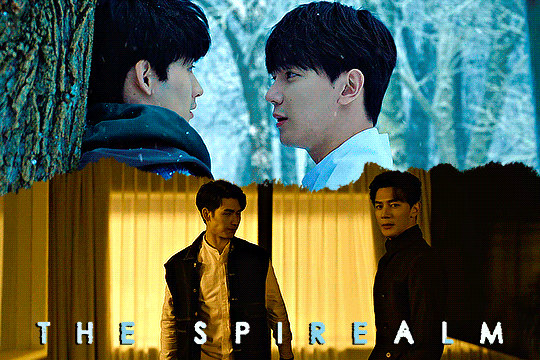
5. The Spirealm
inside of a video game; mystery; fantasy; horror-ish; hopeful ending
A game designer Lin Qiushi is transported inside of a game he recently played, and now he must go through 12 horrifying survivor game doors to survive in the real world. Inside his first door he meets Ruan Nanzhu, a mysterious man who offers him to team up.
The show was taken down from streaming, download files here and subtitles here.
Various WLW mini web-dramas here.
Various WLW short films here.
56 notes
·
View notes
Text
Sooo, I saw the Barbie movie yesterday. Thoughts (and spoilers) below:
********************************
• Honestly? It was better than I thought it would be.
• This film was an absolute trainwreck. But in a good way???
• It violently swings between being fun, goofy, playful, and being almost too real for comfort. And every time it gets too real, we try to repress it. Barbie tries to repress it. Gloria tries to escape just a little. When the world gets too much for us, we escape via make belief. We play with barbies. But Barbie does not belittle that escapism, but instead positions it as a real source of inspiration and change.
• So yes, this film was scarily relatable at times. Not even just in Gloria's monologue. But also when Barbie says she is afraid in the real world, or when she says she is not good at anything. Those things hit hard.
• On the brighter side, this film was also delightfully gay. Not explicitly, but implicitly in so many moments. Romance between Barbie and Ken does not happen. In fact, no straight romance really happens. AT ALL. The Kens hold hands and find each other very cool. Barbie and Gloria are in love at first sight and become an annoyingly cute couple which their teenage daughter could barf at (not much interpretation is needed for this take, believe me). There is a tender make-up scene. Their song is "closer to fine" by the Indigo Girls.
• Ken takes over Barbieland because he was friendzoned. Yes, there are other reasons too, but I feel like the 'man who is friendzoned and does NOT handle it well' really touched on something.
• The film also makes a point that matriarchy, too, is unfair. Barbie was not so much better than Ken when the barbies were in charge, and that argument too needs to be heard.
• Nevertheless, President Barbie is everything, especially when she gets censored by Mattel.
• Kate McKinnon as weird Barbie was also everything. Like. The movie is queer to me just for having Kate McKinnon in it. But for so many other reasons, too.
• I loved Helen Mirren as narrator. She is just one of those women we can all look up to.
#barbie#barbie 2023#barbie spoilers#spoilers#greta gerwig#margot robbie#america ferrera#kate mckinnon#helen mirren#barbie and ken#president barbie#weird barbie#queer#lesbian#personal thoughts
231 notes
·
View notes
Text
Posted on January 28, 2022 by J Parampathu
Case readers with the Incarcerated Workers Organizing Committee are volunteers who assist incarcerated members of the Industrial Workers of the World with filing legal appeals and grievances against their prisons’ administrators. While case readers do not provide legal services per se, they do connect incarcerated people with information and resources by looking up relevant case law, formatting legal documents, and researching procedural requirements. Case readers may be outside supporters or incarcerated people themselves.
Incarcerated people receiving legal assistance from a lawyer may nevertheless benefit from case readers. When incarcerated people are having difficulties communicating with their lawyers, for example, case readers on the outside can follow up with attorneys to ensure that they remain accountable to their clients. Having a case reader advocating on the outside also helps keep both legal offices and prison administrators aware that incarcerated people have supportive communities, which can thereby ensure that they are not denied their rights or simply ignored. Case readers on the outside may also assist incarcerated people by hand-delivering mail and other documents, as well as covering legal fees, with IWOC providing reimbursement.
Maintaining lines of communication is a serious barrier for effective prison assistance, and the nature of IWOC’s work presents unique difficulties to organizing. Legal barriers can prevent IWOC stipends from reaching incarcerated case readers, and related correspondence is routinely subjected to search and censor. Incarcerated case readers may also face reprisal for their activities and be punished harshly.
Brianna Peril, a founding member of IWOC, notes that while incarcerated people working on appeals may not face retaliation for doing so, those who are filing cases against their prisons and administrators, or organizing to improve conditions, are often brutally suppressed. Incarcerated case readers therefore take on immense personal risk in providing assistance to fellow incarcerated people. Peril notes that, while incarcerated case readers know that their work with IWOC puts them at risk of retaliation, they nevertheless continue and persevere.
When asked why case readers may be preferable to traditional legal assistance, Peril answers, “Well, for one, it actually exists.” In other words: Because of the long odds involved with winning appellate cases and the little chance of any monetary reward involved with prison grievances, these cases typically do not attract the attention of financially motivated legal professionals. Traditional counsel is thus often cost prohibitive, and the otherwise free legal aid available to incarcerated people is spread quite thin. Add the additional difficulties of communicating with incarcerated clients, as compared to those still awaiting trial, and case readers can be an incarcerated person’s only hope.
Interested in getting involved? Contact IWOC today.
581 notes
·
View notes
Text
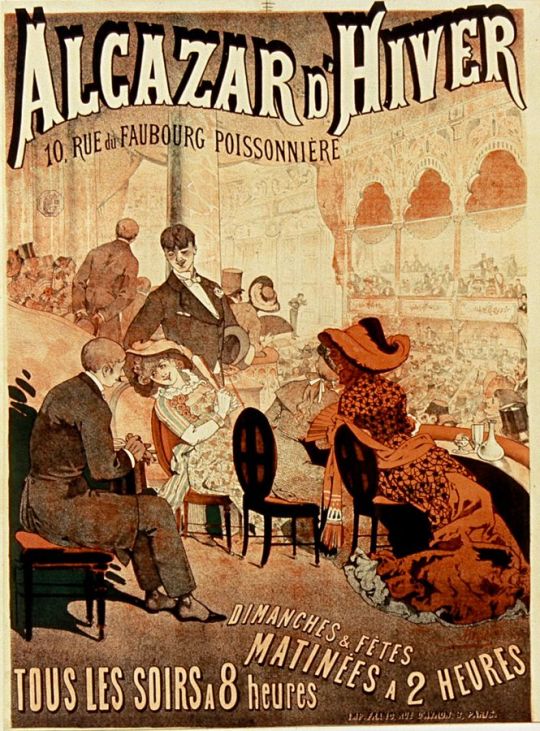
Léon Choubrac - Alcazar d'Hiver - 1882
Léon Choubrac (17 November 1847 – 5 April 1885), who sometimes signed his drawings with Hope, was a French poster designer and illustrator based in Paris.
With his younger brother Alfred Choubrac, Léon was trained as a classical artist with the painters Charles Doërr and Isidore Pils at the École des Beaux Arts. The Choubrac brothers came very soon to the poster, practicing since 1875 the modern treatment of colors and typography, associated with images thanks to chromolithography.
In the early 1870s, the Choubrac brothers and Jules Chéret (known as "the father of the modern poster") reduced the cost of colour lithography introducing technical advances. Additionally, in 1881 restrictions on bill-posting (affichage) were lifted and eased state control of the media in France. In 1884, the Paris city council started to rent out surfaces belonging to the municipality, paving the way for a rapid increase in the production and distribution of advertising posters. Posters with clear colours and dashing images appeared all over town during the vibrant spirit of the Belle Époque.
Léon Choubrac drew some posters that higher authorities seized or torn down, amongst others one that showed a woman tortured in the presence of the Pope. Another poster, The secret loves of Pius IX, showed the portrait of Pope Pius IX below a series of portraits with heads of young women. The censor made him add a beard to the head of the Pope to disguise it. The poster nevertheless caused a scandal and was torn down by order of the French Minister of the Interior François Allain-Targé.
Léon and Alfred created the Ateliers Choubrac. As an illustrator, he sometimes collaborated with his brother in Gil Blas or the satirical weekly Le Courrier français, among others. Choubrac illustrated several works by Emile Zola. Although Leon died young (1885), his brother Alfred went on to produce an impressive number of posters for Parisian entertainers, theatres, businesses and various commercial products.
The poster collector Ernest Maindron, who wrote the first essay about the illustrated poster in the Gazette des Beaux-Arts in 1884, and later published the first book on the subject (Les Affiches Illustrees) in 1886, mentioned the Choubrac brothers, along with and Chéret, among the pioneers of the illustrated poster.
29 notes
·
View notes
Text
Brief history of anti-LGBT legislations in Russia
Throughout 90s and 2000s there were no discriminatory laws in Russia. There were openly queer celebrities (whether they said they were for PR alone or not is a complicated subject. Nevertheless, there were people who gained popularity and presented queer)
In 2013 the first legislation passed. It was an "anti-propaganda" law to "protect children" from becoming gay. The way to work around it was putting +18 on any piece of media or an event that contained even a mention of the subject.
In 2022 anti-propaganda law stopped being for children only. LGBT was mentioned next to pedophilia, both in the same regard. The law was rushed (like many of the oppressive laws since the invasion in Ukraine) and it was not clear what exactly it meant. In practice it mostly affected movies, TV and internet publications.
Earlier this year, in june 2023, ban of transgender transitioning was put in place. Once again, very poorly worded. This one and the previous one had two main functions:
To censor opposition. Most of those, who disagree with the current state of politics in Russia, if not outright support LGBT, at least don't mind. This information can be dug up and used against said people.
To create an enemy. The war was supposed to be won quickly. They promoted their army to be the second greatest in the word, they promised to take Kyiv in 3 days. Nothing of that happened, but life for everyday people got worse. One of the ways to redirect that frustration is fight an enemy that doesn't exist.
The russian government does not care about queer people nor understands us. They preach to their electorate that they nurtured to hate any "other". They make russian believe that our neighbors are nazis, the whole world wants us dead and they take our children by making them gay. I believed this is where they would stop.
There is no "LGBT organisation" in Russia. Before that they tried to find any minute reason or make up a reason to silence the opposition. Now they don't even need the organisation to exist.
Once again, the words are very loose, so they can use the law in any way they see fit - a very popular practice. It is not yet active, the court decision does not specify that exactly. Some sources say it will be 10th of January, 2024.
Any display of "non traditional values" will be equated to terrorism.
#lgbtqia#lgbtq#lgbt#russia#legislation#homophobia#any correction is welcome#i didnt mention all of the homophobic laws#these ones are the once that affected public life the most#however sad that is#terrifying even#all of that is only one symptom of a very large problem#and i dont know if there is a solution#other than to wait for the system to fall under its own weight#i heard people comparing this to iran#where government censorship and sanctions are lasting decades now#political activists are being censored#eco-activists#teachers#i cant even feel sad anymore
45 notes
·
View notes
Text
Turtles Catches Up With Old GMMTV: Together With Me/MaxTul Ship Edition
[What’s going on here? After joining Tumblr and discovering Thai BLs through KinnPorsche in 2022, I began watching GMMTV’s new offerings -- and realized that I had a lot of history to catch up on, to appreciate the more recent works that I was delving into. From tropes to BL frameworks, what we’re watching now hails from somewhere, and I’m learning about Thai BL's history through what I’m calling the Old GMMTV Challenge (OGMMTVC). Starting with recommendations from @absolutebl on their post regarding how GMMTV is correcting for its mistakes with its shows today, I’ve made an expansive list to get me through a condensed history of essential/classic/significant Thai BLs produced by GMMTV and many other BL studios. My watchlist, pasted below, lists what I’ve watched and what’s upcoming, along with the reviews I’ve written so far. I’ve covered Love Sick, SOTUS, and Make It Right so far, and today I offer my thoughts on Together With Me and the MaxTul ship. Thanks to @manogirl for your encouragement to add this to my watchlist!]
Okay! Together With Me. Well -- well, well, WELL.
First off: I’m VERY glad I added this drama to my list, and I want to give big ups again to @manogirl for being the loudest supporter of my adding this to the OGMMTVC and learning about the first high heat ship in Thai BLs. Secondly, I have to admit a mistake. I put Together With Me in-between the first and second seasons of Make It Right on my watchlist (pasted below), but I got the airing dates mixed up -- MIR2 aired before TwM, but I watched TwM first. Womp. I’ll fix my list below. (Thanks to @bengiyo for filling me in on important details about MIR2 so that I can make accurate comparisons in this piece!)
Even though I haven’t watched all of MIR2 yet, I can project from the early episodes what happens -- more heat, more chaos, more teenage angst. (MY DEAR CONFUSED FUSE. MY DEAR HEATY FRAMEBOOK.)
Nevertheless, TwM still provided some fabulous comparative material for me to understand where BL had gone from the time of 2014/2015 Love Sick to the 2017 moment of TwM’s airing.
2016 was a big year in Thailand, I now realize. SOTUS premieres as the first BL-BL -- the first show that was a BL, that focused solely on a main queer coupling. Then Make It Right airs, and it’s pulpy, wild, open, longing, full of implied teenage sex and direct communication about the befores, the durings, and the afters. Make It Right, as the dear @bengiyo stated, depicted a world in which teenage boys are able to explore queerness without being punished for it.
Then we get in 2017, and the second season of MIR2, which has more implied heat than the first season. AND THEN, THEN: we get Together With Me. And just, WOW -- did this show ever benefit from the road that Love Sick, SOTUS, and Make It Right/MIR2 paved.
Why?
One thing I wonder is: could we have EVER gotten two JACKED jocks like Max and Tul in a BL ship if LS/SOTUS/MIR/MIR2 had NOT aired before TwM?
I would actually love to entertain that as a question to the family that reads these posts. Because my own thinking is: no. I’m thinking that Captain and White walked so that Max and Tul could do it on camera run. They warmed up the censors to maybe relax a little. I would argue that the previous BLs and BL-inspired material gave MaxTul the safety, as two clearly masculine-presenting men -- stereotypically jacked, jocky, college-aged, huge, masculine, male-men -- to be the first big heat ship, as @manogirl stated, in Thai BL.
I think audiences were likely primed and ready, if they were following SOTUS (with no heat) and MIR/MIR2 (with high school-teenage heat), to GET some HEATY detail from some VERY BEAUTIFUL, SLIGHTLY OLDER MEN -- men who were also about to have some very moving queer revelations happen between them.
In other words -- the audiences had been titillated enough. As @bengiyo has reminded me: yaoi manga was tremendously popular in Thailand at this time, and showmakers were taking notice. The audiences were likely ready for ACTION-action. And MaxTul were up to the challenge.
(Also for context, I also want to acknowledge a note that @bengiyo sent to me about what Thailand was likely paying attention to across the rest of Asia -- as more BLs were coming out of Japan, Taiwan, and China before censorship. From those perspectives as well -- those different cultural reads on yaoi -- Thailand was likely also inspired. I seriously welcome input from the whole OGMMTVC family -- I’m thinking, besides @bengiyo, @absolutebl, @nieves-de-sugui, @so-much-yet-to-learn, and others might have insight on this -- about what outside cultural factors I’m likely missing from my analyses. I’d love to be filled in by the experts on any cross-cultural context y’all think is helpful from the comparative worldview of what was happening at this moment in time.)
So we get to MaxTul, KornKnock, that first scene of episode 1 that had me going WHOA -- I mean, I don’t know what I’ve missed in the intervening years, but even today, we don’t have many series just going STRAIGHT to it.
I was impressed.
Now, AFTER THAT? Oy vey, ha.
I wrote in a post right after I finished watching TwM, that I felt like while I had watched a show in a university setting, that for some reason, a lot of the show took me back to high school.
I wouldn’t criticize TwM as necessarily missing something by way of tone. Rather, I would argue that TwM experimented with a kind of tone that at least I haven’t experienced yet in my otherwise chronological watching of early Thai BLs. Namely -- TwM approached its material with a kind of...flippant tone, if that makes sense.
The script was larded with sexism and sometimes crude insinuations about queerness. The show went into VERY questionable territory with two ethical boundaries of doctor-patient relations and teacher-student relations. (I admittedly could not help but think of the recent debates around the Wat-Sani ship in the recent Our Skyy 2 x The Eclipse episodes -- but I think the Kavi x Phu ship was on a different, much more problematic level, as there was active engagement by a teacher to ultimately not separate herself from a student.) (And that didn’t even come close to approaching the problematic nature of the Dr. Bright x Farm ship.)
Really quickly about the sexism, before I get back to the boys. It was really interesting to me when it was used, and when it was NOT used. Plern is, in the words of @lurkingshan, the ultimate faen fatale. Bitchy, conniving, smart-but-not -- a true villain. Aim of Love Sick couldn’t even try to compete. Prae was a ditz, and Miki was vengeful, but Plern thought she was smart, had it all, and deserved everything she wanted without trying.
But Yihwa presented with LOYALTY, intelligence, insight, and grace. And Faii presented with a chill demeanor and analytical skills, and surprisingly -- even while she was ASSUMED to NOT be athletic -- was shown playing soccer/football BETTER than the boys, which I think was VERY NICE to see in a 2017 drama. (That pushed a neat kind of boundary for me.)
Yihwa and Faii in particular defy the paradigm of setting up female characters against stereotypes of male success. What made them possibly the strongest female characters I’ve seen in a BL is that they used the characteristics of their enemies to get back at their enemies. That was smart. They broke through a lot of what could have really sunk this show, and lifted the show intelligently.
So what COULD have sunk this show? List time:
1) The Dr. Bright x Farm ship. I was honestly so grossed out by this that I don’t even want to spend time writing on it. And I am HELL-FUCKING glad that I am NOT going NEAR the second season, because I understand that there’s a redemption arc for Bright. I’m very disappointed by this storyline, as I think it saddles an out gay man with stereotypes about sexual preferences that can be done safely (like group activity), and instead presented those preferences as predatory. And then Farm goes from played-to-player. In my opinion, when the Tumblr fam warned me about this show being toxic -- this ship was toxic factor #1 by far.
2) Knock and his cluelessness. Holding on an actual MaxTul analysis for the moment -- Korn and Knock were interesting characters for me to see interacting with each other. I mean, Korn’s admission to Knock, I would argue, actually came (HA HA) a little fast (HA HA) for Knock to process. No, but seriously. A passionate hook-up, Knock’s VERY adamant reaction towards Korn afterwards, and then Knock’s warbling back-and-forth between Plern and Korn. Knock had everything happening to him and at him -- gay-for-you, lingering girlfriend, the inching back to his same-sex lover -- and I’d argue that Knock was just a little...let’s say....diluted and bro-y about it all. I could have seen a little more emotional passion. I could have seen a little more real and introspective struggle (save for the internet posts). I did like that conversation Knock had with Bright about “gay for you” -- where Bright, as an out gay man, kind of corrected Knock to say, yes, it’s a little gay, what you’re feeling -- but that’s okay, it’s normal, and I’m here for you.
3) Jocks in love. But Knock’s behavior, and to an extent, Korn’s behavior as well, was, well -- jocky. Knock, I think, was very much like -- “why is this all happening to MEEEEE, my broooosss, crying on my beddddd??” To me, at least, what reminded me about high school with this show WAS this jockish approach to romance. The show presented Knock posting on the internet, for instance -- but not spending time thinking exactly about what those posts and answers meant.
For comparison, Bright and Farm, as the other same-sex ship in the show, were presented in a predatory match-up. We didn’t have femme-presenting characters (like Christina in MIR) or other trope-y or stereotypical elements of queer behavior that we had seen in dramas past.
I think the jocks-in-love approach to this show, which came naturally by way of how Max and Tul LOOK and CARRY THEMSELVES -- was risky. Knock was kind of the perfect nickname for that character. He wasn’t a dude that was very able to read between any lines. His true revelation about Plern came when idiot Plern spilled her beans to other people, that dumbass. And I think a lot of the way Knock accused Korn of Korn’s own feelings, and Korn’s behavior in “taking advantage” of Knock, came out of jockish cluelessness. When Korn said, “I love you, dipshit!”, “dipshit” was ABSOLUTELY the right word to use to the continually clueless Knock.
ALL OF THAT BEING SAID. (Leaving Bright and Farm aside forever, let us never speak their names again.)
I think Max and Tul themselves were a revelation. Were they AS SKILLED ACTORS as Singto in SOTUS, or Ohm and Toey in Make It Right? Oh god, no. Were they AS BAD as Krist? No, no, no one comes close. And were they AS INEXPERIENCED as Captain and White when those two first debuted? Also, no.
Max and Tul, I think, seized a different damn moment. I’m actually not sure I’d say there was electric chemistry between them. I think they both acted WELL, but there wasn’t EMOTIONAL sizzle, at least the kind I look for. They were certainly bros and homies -- but longing gazes à la Tee and Fuse, they did not have.
What they DID do, with their PHYSICALITY, was break boundaries by way of what we could SEE, without needing to read between lines or analyze shit. We just SAW THEM DO IT, tear off shirts and make out and bounce around and show off their muscular anatomy, and I think THAT was actually groundbreaking. I think IN THAT -- the boys knew EXACTLY what they were doing, they KNEW they could do it well, and they DID do it well -- and I didn’t see an iota of hesitation from either of them. And I thought that was really impressive. And I think these guys knew -- by DOING THAT SO WELL -- that they were breaking important ground in the world of television BL. The viewers -- those viewers who, like Knock, don’t like or WANT to read between lines -- THEY GOT what Max and Tul were serving.
What I also find impressive is that these guys IRL are serious allies. Their social media profiles, for the both of them, are gilded with allyship. That’s huge to me. (Tul at NYC Pride, come awn.) They’re owning their ownership of a slice of representation -- again, as jocky dudes in real life who engage fearlessly in queer material. (I now can’t wait for The Outing.)
Honestly? Yes, TwM was at times either painfully and/or hilariously toxic. I think the Bright x Farm ship is violent and harmful, and I truly wish it didn’t exist.
But I’m glad I watched TwM because -- well, fuck it, I’m an old mom, and I like to see jacked, shirtless dudes sometimes.
BUT ALSO: I think the makers of TwM knew that there were VIEWERS who WANTED TO JUST SEE QUEER MEN BE QUEER MEN WITH MEN, and you know what? I think the show’s creators said to themselves -- well, hot damn, maybe we have something here. And now’s (in 2017) the time for it. Sometimes I don’t want to read between the lines, too -- sometimes, I want a show that I can watch with a damn martini in a Solo cup and just be like, ooooh, man tiddies!
And the show creators found Max and Tul for Bad Romance, and realized, yes -- let’s spin this off, because there’s an audience out there who wants this. And I think that was accurate then, and now. Award-winning actors, Max and Tul are not. But they are VERY important to my historical understanding for how queer representation was progressing in BLs at the time of TwM -- in a vastly different fashion than Love Sick, SOTUS, and MIR had set up in their own worlds and their own paradigms.
I think TwM created a paradigm of its own -- one that I think has helped BL to grow at least in quantity, maybe not in quality, but at least paved a road that allowed creators to think and to say, well -- if we lead with the sex, we can still make a show. I see the OG BL fans on Tumblr marveling often at the sheer volume of BLs we have now. I want to think that that happened in part for what TwM created -- the permission, the openness, and the standard to do just that. And for the fans that want that content? We live in a world now where we have our fair share of shows to choose from. I think TwM created a paradigm that we didn’t know we needed in 2017. And I don’t regret -- even if it’s not my preferred style of drama -- having the option to watch a cheesy, jocky show every so often. Instead, I feel lucky that in 2023, I can have my choice.
[Alright! It was so much fun late-night liveblogging TwM and hopping on the Yihwa bandwagon, and I’m getting back into doing it for Make It Right 2. Thanks to everyone who answered my questions about TwM along the way: @manogirl, @nieves-de-sugui, @absolutebl, @crowie, @clairificusrex, @respectthepetty, @bengiyo, @shortpplfedup, @kyr-kun-chan, @telomeke, @miscellar (I will always be looking for the BBS connections, friends telomeke and miscellar, haha), @lurkingshan, and apologies if I’m missing anyone else -- thank you, family!
Watchlist update below, which is corrected for chronology for Make It Right 2. And...unbelievably...I’m adding something else to this list. I’m gonna add SOTUS S. I vowed I wouldn’t because of Krist, but. Since I am NOT, EVER, going to watch the continuation of TwM, I want to watch the continuation of another early series, besides Make It Right 2/FrameBook, to see the maturing of a relationship, as I’ve been involved in excellent convos with @bengiyo and friends about how length-and-depth-in-committed-relationships is NOT the most popular of BL themes -- but it’s a theme that literally brought me to Asian BLs via Kinou Nani Tabeta so many years ago. (I’ve read a lot that SOTUS S is better than SOTUS anyway, and it has my beloved Nammon in it.) I’m wondering if seeing a relationship developing and maturing is an important movement for Thai BLs at the end of 2017 into 2018, maybe a theme that hadn’t been explored YET, before TwM’s continuation, and one that might feed into the shows of 2018 and beyond. And I’m wondering if it’s important, as MaxTul was, for seeing the KristSingto ship move forward -- especially as I get prepared to FINALLY get to He’s Coming To Me, and getting to understand the impact of what Aof, Singto, and Ohm Pawat did to split the KristSingto ship. As always, I welcome any feedback!
1) Love Sick and Love Sick 2 (2014 and 2015) (review here)
2) SOTUS (2016) (review here)
3) Make It Right (2016) (review here)
4) Make It Right 2 (2017) (watching)
5) Together With Me (2017)
6) SOTUS S (2017-2018)
7) Love By Chance (2018)
8) Kiss Me Again: PeteKao cuts (2018)
9) He’s Coming To Me (2019)
10) Dark Blue Kiss (2019)
11) TharnType (2019)
12) Theory of Love (2019)
13) Dew the Movie (2019) (not an official part of the OGMMTVC watchlist, but I want to watch this in chronological order with everything else)
14) Until We Meet Again (2019-2020)
15) 2gether (2020)
16) Still 2gether (2020)
17) I Told Sunset About You (2020)
18) A Tale of Thousand Stars (2021) (review here)
19) I Promised You the Moon (2021)
20) Not Me (2021-2022)
21) Bad Buddy (2021-2022) (thesis here)
22) KinnPorsche (2022) (tag here)
23) The Eclipse (2022) (tag here)
24) My School President (2022-2023)
25) Moonlight Chicken (2023) (tag here)
#together with me#together with me meta#maxtul#korn x knock#knock x korn#kornknock#turtles catches up with the essential bls#turtles catches up with thai bls#turtles catches up with old gmmtv#the old gmmtv challenge#ogmmtvc#max nattapol#tul pakorn
135 notes
·
View notes
Photo

Why I am not coming back to tumblr
(First of all: follow me on https://twitter.com/Marsfotografo if you like daily uncesored photo posts)
Recently, tumblr realized that its step back into medieval "Facebook times" with strict censorship of all beautiful nudity was, if not a sad suicide attempt, then at least a dramatic case of idiotic self-harm. It therefore recently announced that nudity was allowed again and "invited" artists to rescue tumblr from its agony with their work.
I actually considered returning to tumblr even though they had intentionally destroyed my years of work especially on my other two blogs (and the work of many other artists). Before doing so, however, I wanted my posts restored that tumblr had censored in the dark ages of its anti-nipple delirium.
I therefore appealed the perfectly innocuous photos first, about 10 posts. After just a few hours, I received notification for all of them that after "careful review" it was determined violating the community rules. They added "Don’t worry, this post hasn’t been deleted, it is just hidden from public view". I don't know if I should take that as ironic or as sarcastic.
Not a single one of these pictures is sexual in any way. I have deliberately appealed only those photos that have no sexual message whatsoever and that do not show any ambiguous or "inviting" poses, and certainly no intimate parts. Nevertheless...
Running a beautiful, meaningful blog that followers enjoy is a lot of work. Work that I was happy to take on when tumblr was still a free platform that also allowed non-orthodox artists to connect with people who enjoy their work. But I'm not willing to give my time and work to save a drifting platform that bullies its creatives with absurd rules and tries to re-educate them. I don't want to post good humor with the risk that some diehard will censor that post.
For inane junk, there's already Facebook and Instagram, where you can check out the latest hamburger menus before and after digesting by nipple-free plastic creatures. Tumblr isn't necessary for this and in this respect at the moment no longer has a raison d'être for me.
Right now for artists who don't want to abide by nudity-phobic rules, only Twitter remains.
There I post several uncensored pictures every day. My account is still relatively small, even though more than 2000 new followers have joined since August 2022.
I'm happy if you visit me there: https://twitter.com/Marsfotografo
192 notes
·
View notes
Text
"The Cat That Went to Heaven" is a book that's been a favorite of mine since I was a child. It's about an impoverished painter who adopts a cat, a creature considered proud and unholy by his religion.
The painter is commissioned to paint the Death of Buddha and all the animals who surrounded him at the time, a once-in-a-lifetime commission from the priests that would him out of poverty and put his work in a place of great honor.

The cat takes great interest in the painting, but realizes as each animal is painted, carefully, meticulously, the artist meditating on the meaning and life of each one, that the cat is nowhere to be found.
The artist, perceiving the cause of her growing distress, sadly informs her that she is damned. She cannot have a place in this painting.
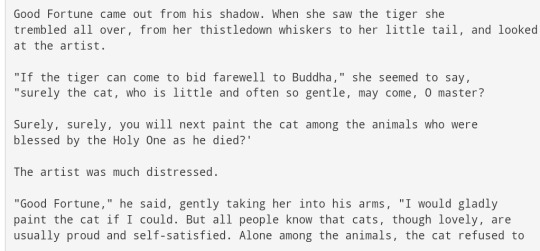
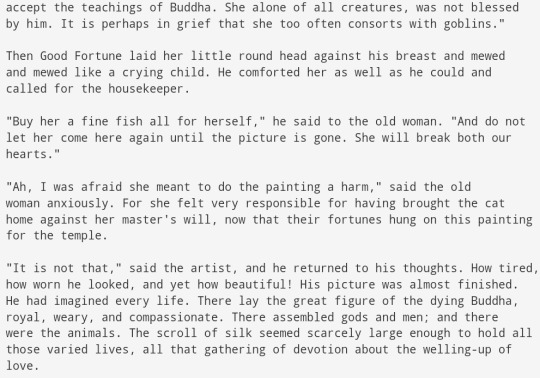
Unable to bear the misery and heartbreak of his cat at being beyond redemption for the mere circumstances of her birth, he finally paints her, defying the priests and his own salvation.

Although I didn't understand why this book spoke to me so much at the time, as a queer adult, the impact of representation - or the lack thereof - is something I find meaning in as much as Good Fortune.
We as LGBT+ people are told we're damned - sometimes harshly, sometimes sympathetically, but nevertheless damned, and to associate with us is to be likewise damned. Good Fortune was not saved by the sympathy of the painter, but by his determination to do right by her at great cost to himself.
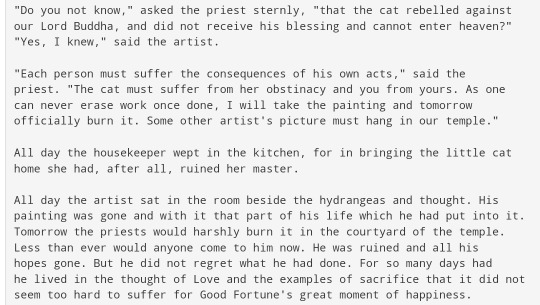
It was not sympathy or "tolerance" that saved Good Fortune, but love and acceptance and the notion that she deserved better than damnation.

This is something I feel in the growing movement to portray LGBT+ people in fiction and to openly support us, and the progression of something past tolerance, something beyond the mere sympathy of the undamned, in people not utilizing the easy excuse of censors or public judgement, but openly aligning themselves with queer people out of the idea that we deserve better than damnation.
At a time when our own governments are trying to destroy us for the convenience of having an acceptable target, and we're staring down the barrel of being doomed by the shrug of shoulders, by apathy, by the idea that there's nothing more to do but to love the sinner and hate the sin and sigh at a mad world, to paint us in a painting that others would burn is everything.
24 notes
·
View notes
Note
Do you have favorite BL dramas or movies? If you do, what's your top 20 Asian BL dramas or movies?
Hi anon! 💙 Thank you for this ask! I can make a list! I love it 🥰
Of course I have favorites and I am so thankful you ask for my 20 favorite bls, because 10 would be too hard 😅
I don't have any logical reason behind my choices. Most of the times I go with the feeling I have while watching the show. The following is not a best to last ranking, just my top 20 favorite shows 😊
Goodbye Mother
A vietnamese movie about a young man, Van, who visits his family for the first time after being abroad for nine years. He doesn't come alone, but brings his boyfriend Ian with him. Van waits for the best moment to come out to his family and present Ian as his partner. It is more of a family drama than the typical bl, but it is such a good movie. The grandmother is the heart and soul of it all. It provides everything, happiness, sadness, anger, pain, love...just a perfect movie. It is still available on GagaOOLala, but on the list to leave soon.
A Tale Of Thousand Stars
One of my feel-good-series. EarthMix is one of my favorite pairing and they went crazy with all the staring and pining. The story of Tian and Phupha who meet at a village in the forest where Tian works as a volunteer teacher and Phupha is the local Chief Forest Officer. We whitness how two people get to know each other, understand each other and develop feelings for each other. It is a romantic fairytale dealing with important and serious issues and I love it! You can watch it free on Youtube.
Moonlight Chicken

Speaking of EarthMix...Moonlight Chicken is my newest favorite and one of the easiest decisions for picking as a favorite. It is a short series, but it tells so many stories in a perfect way. No character comes too short, no realtionship is undeveloped. It is such a perfect series. EarthMix are killing it, but GeminiFourth stole the show. Their depiction of a this first love between a deaf young man and an angry young man was just so beautiful. Both had their dreams and both felt unheard and unseen from the outside (especially the parents and guardians) and they developed such a pure and beautiful bond. I could go on and on about the beauty of this show. Perfect and free to watch on Youtube.
My School President

And another GeminiFourth project. I am so in love with this show. It is something personal. The story about a first love and such a healthy love and Tin, our school president is one walking green flag. The show helped me on a very personal level to understand parts of my own history and choices and I am forever grateful and will keep this in my heart. And besides that it is such a comfort watch. Every conflict is dealt with before the episodes end and there is no drama, just love and respect. I love it! It is also free on Youtube.
Triage
This is something else. We have time loops and some supernatural stuff happening while the main character tries to rescue this young man who is as it turns out the love of his life. And when it looks like it finally can work out, destiny or in this case a higher entity, plays a little bit with time and fucks everyting up again. It is really interesting and tense and there are twists and it is just amazing!
The Untamed
Does this count as a bl? It is not the typical bl, more a censored adaptation of same-sex original work from China. Nevertheless you can see the love and affection between Lan Zhan and Wei Ying. This is a masterpiece. When I tell people about it, who don't watch asian dramas, I always tell them it is better than Game of Thrones for me, so they can put it in relation. This show wrecked me. I cried like never before. And I can't put into words what this series made me feel. It is on Viki and WeTV.
180 Degree Longitude Passes Through Us

Speaking of non typical bls stuff. 180 degree is such a good series. It is difficult to watch, because it feels really raw at parts and it deals with so much stuff, like homophobia, grief, internal homophobia, trauma, loss, love different kinds of relationship, growing up and stagnation, resignation. And the cinematography, uuuhhh! Such a beautiful series and in everything you see on screen you can intepret something in it. As a person who studied language and the comparison between novels and their adaptations, this was heaven for my intepretation loving heart. You can watch it on GagaOOLala.
A First Love Story
Strongberry at its best. It is korean and a short film in two parts and perfect. It tells the story of two best friends who have feelings for each other, but one of them enlisted and has to go to the military soon. We meet them again after some time and get a very intimate view on a very short part of their lifes. The acting is good, the story is good, the chemistry is good. You can watch it on Youtube or soon it will be on GagaOOLala again.
Be Loved in House: I Do
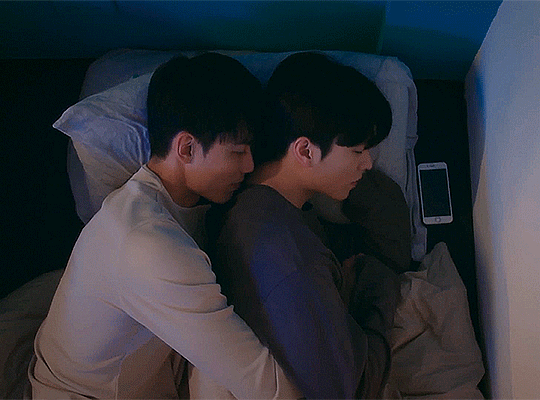
My comfort watch. This is nothing special. It is just a workplace romance, but it feels so cozy and I love the story. It makes me feel all the butterflies and happiness in my stomach and I love this shit! The company gets a new boss, who is very strict, has a bunch of rules and forbids his co-workers to date, because love can be a distraction and because of his own personal trauma. Can his stone-cold heart be warmed-up again? Oh the cuddles are everything for me! It is on Viki.
History 2: Crossing the line
I like most of the HIStory shows, but tis one I like the most. I do love the secondary couple of HIStory 3: Make our days count and HIStory 4: Close to you (I know...don't judge me), but as a whole series I really like this one the most. Perhaps because it is something different with the whole Volleyball thing or because I think the main couple is just so sweet. I don't know, I like to rewatch it from time to time. You can watch it on Viki.
Bad Buddy
My first asian bl ever. I am so happy I could start with this one. I love the story of Pat and Pran. Enemies to lovers is something else and they did a really good job. And their love was so vulnerable and sweet. Even though Pat always tried to be the strong kind of macho man, he was soft and sweet with Pran and it was so cute to watch. And the iconic rooftop scene! What a scene! It is free on Youtube.
Long Time No See

Another movie. I don't want to spoil anything. This has assasins and mafia and love and romance and sweetness and blood and fighting. It is not the typical bl stuff, it is more mature, but a really good action movie in my eyes. I liked the drama and the action scenes. As it is leaving GagaOOLala soon, I just rewatched it and it is still good!
Semantic Error
I don't know how many times I rewatched this one. The enemies to lovers story that just melts my heart. I am reading the manhwa and this is so explicit! The series is so tuned down from the original. Nevertheless I love the story of how SangWoo made his way into JaeYoungs heart and melted our all hearts on the way. This one is on Viki.
Old Fashion Cupcake
The story of the 29 years old Togawa who tries to show 39 years old Nozue how beautiful life can be. And what better way to show him than to eat the most delicious sweets ever. I am always hungry and craving for sweets after watching this. This series gives hope. You are never too old to start enjoying life and to allow yourself to love again, even if the person is ten years younger. And another one you can watch on Viki.
Love Mechanics

I guess this is here because of YinWar. I mean, their chemistry is through the roof! The story itself...well...cheating and pain and War is crying quite often. But it is still good and I can't stop rewatching it. Yes the story is hurtful and a little bit stupid, but VeeMark are adorable when they are happy and in love. It can be watched on WeTV.
DNA Says Love You
We all love some slow burn, right? I mean, this one is very much slow burning, but with a reason and it is a really interesting story behind all that. It is a complex story with some really good staring and pining and hurt and comfort. You have to watch carefully to understand everything, but it is worth it and the wait while our hearts burn away through the slow burn is worth it too.
Gaya Sa Pelikula (Like in the movies)
This one is...it is cute. I don't know what else to say. It is not the best production, but the story is good and the actors are doing a good job. Karl needs to live on his own because a family tradition says it is a good idea to show early on how to survive alone in this world. So he moves into his uncle's apartment where he meets his neighbour Vlad and because of some reasons the end up living together. I love the soundtrack and their whole story. It is free on Youtube.
Once Again

My favorite bl series of 2022. It tells the story of Shin Jae Woo who deals with childhood trauma and because of some supernatural stuff happening, he jumps back in time to the year he was almost the victime of a crime, but Kang Ji Hoon helped him back then. JaeWoo wants to rescue JiHoon from this path. I was crying through most of the second half of this series. It is just so good. Painful and hurtful. Just watch is you can deal with sad stuff. Everytime I need a good cry, I come back here and it always works its magic. It si on Viki and GagaOOLala.
We best love: No. 1 for you
The true enemies to lovers story. The slow burn and the slow realisation is just so perfect. I feel with Gao Shi De through this whole story. I love to rewtach it and see things I haven't before. And the second season is good as well! Not as good as the first one for me, but still really good. You can watch it on WeTV.
Secret Crush On You
If you manage to get past the first episode full of cringe and you learn things about the characters, you see that these are all of us. The characters are not flawless, they make us cringe, because it feels too real. You can't act normal when you are living your secret crush. And you feel uncomfortable if you don't fit the norms. It is so beautiful to see that there are people out there who love you for who you are. And who isn't afraid to tell the world about it. This series makes my heart feel all the beautiful feelings. It is a little gem out there. And you can watch it for free on youtube.
Well these are my top 20 of all the bls I have watched. It was so much fun! Thank you for this ask!
I guess after this month there are going to be new favorites. Our Dating Sim or A Shoulder To Cry On are some really good shows and I hope they won't mess it up in the end like Oh! My Assistent did.
Have a beautiful day and stay happy and healthy! 💜
#josi answers#josi watching bl#top 20 bls#korean bl#thai bl#taiwanese bl#pinoy bl#japanese bl#my school president#moonlight chicken#once again#secret crush on you#dna says love you#love mechanics#and many more#bl recommendations#I guess#thank you for the ask!#it was really fun talking about my favorite shows
82 notes
·
View notes
Text
As Promised, The Israel-Palestine Megapost of Doom
Content Warning: This post discusses both the history of the Israel-Palestine conflict and the current Israel-Gaza War. As such, it contains frank discussions of apartheid, war crimes, crimes against humanity, genocides both past and present, racism, antisemitism, colonialism, terrorism and more. As an additional tone warning, I guess: I am by nature a pretty flippant person. I’ve been criticized for that in the past, and probably will be again in the future. I don’t know if it's just who I am, or if maybe I need a therapist. I have tried to reign in some of my worse impulses, especially when talking about the actual events themselves, to try to give due respect to those affected. Nevertheless, if that kind of attitude offends or disturbs you, maybe sit this one out.
This post is brought to you in its current form thanks to the generous actions of Dr. Henry Kissinger, whose untimely death many decades after it was deserved nevertheless brought me joy great enough to drag me out of angryposting mode and into hopefully more coherent essay-writing mode. So here is the partially revised, partially rewritten, and greatly expanded post that I promised.
While I don’t have a cohesive thesis, I have written this with the intention of addressing/responding to the state of conversation around the Israel-Palestine conflict, and around the ongoing Israel-Gaza crisis. I am focusing substantially on the online discourse because it’s the only thing I have even a chance of changing. I’m a soon-to-no-longer-be-teenage college sophomore without a lot of disposable income. I’ve already called my Senators and House Rep. I really don’t have much influence beyond my power to try to persuade random internet users to be less bad.
I’ve tried to restrain my tendency for purple prose, self-righteousness, and gratuitous moral judgements; you can be the judge of whether or not I succeeded. I know that I am definitely not an expert or authority on this topic, but neither is most anyone else on this fucking website. It didn’t stop them and it won’t stop me.
But before that, some brief words on my previous post. Unlike my usual angryposting where I tend to regret everything I say and do while in the anger spiral, I can actually say that I stand by more or less everything I said in that post. I do have one correction and one clarification though. Clarification: the “Stealth Echoes” I am referring to are instances where the word Israel or Israeli are placed in quotation marks specifically. Example: As per a spokesperson of the “Israeli” Defense Forces, “Something something ceasefire violation.” Used as such, the “Stealth Echoes” around Israel or Israeli are used to signal belief in the illegitimacy of Israel. It’s literally just (((echoes))) revived. A few people thought I was talking about the use of quotes in quotation marks. Now, the correction: in my anger, I believe that I overstated the prevalence of the “Stealth Echoes”. I said 20-40%, which upon reflection was too high, brought on by seeing a long string of said posts in rapid succession. I would now say that the figure is closer to 5-10%, jumping up to 10-15% if you include instances of censoring Israeli like I*****i and the use of words like Isntreal. I feel that as a practical matter they are indistinguishable; they serve the same purpose. Whatever the number, it is too damn high and should not be going unchallenged. If you’re using them, stop. If you see someone else use them, either in a tweet or on Tumblr, don’t share them.
That done, on with the post!
To start with, I want to establish some important concepts and ideas that I’m going to expand upon later so that you are aware and thinking about them going in. Some of these will seem pretty basic, but they are important. Trust me.
Words mean things. Seriously. Words have meaning, both in isolation and as part of sentences. Many words have very specific meanings, and it is important to use them correctly. Incorrect usage of words deprives language of its utility and power. At certain points in this essay, you might think that I am being overly pedantic, but that specificity is important.
Humans possess a strong drive to create narratives, especially out of history. This is normal; almost all humans do it. However, the tendency towards narrative creates a pitfall where the narrative begins to supplant the actual events in discussion and popular consciousness. Actual history is reshaped, often through omission or erasure, to fit the existing narrative. It is this narrative, not the actual history, that informs attitudes and debate. This is a problem for all history, but especially with a history as long, divisive, and deeply emotionally effective as the Israel-Palestine conflict.
Pragmatism and idealism are broadly speaking two competing approaches towards making plans and decisions. Pragmatism is generally concerned with evaluating the state of reality and making decisions based on their objective practical effects. Though they are not necessarily incompatible, pragmatism possesses no inherent obligations to concepts like justice, morality, or good. Idealism, by contrast, is concerned with defining what the world should look like and aims to achieve that goal. This ideal world can theoretically be informed by anything, but is usually defined by morality. I generally believe that what is is more important than what should be. Whether in matters of politics, diplomacy, or war, it is better to evaluate the state of reality as best you can and tailor your goals to what is practically achievable rather than trying to force reality to conform to your idealized future.
In general, I will try to avoid ascribing intent to any individual or action, except where I feel that concrete evidence of intent is publicly available. Astute readers may know where I am going with this.
Rivers of ink have been spilled teasing apart the differences between Israelis, Jews, Zionists, Palestinians, Arabs, Muslims, and more, and between Palestine and Israel. This post is long enough without retreading all of that here. Nevertheless, I will do my best to use specific, accurate terminology where applicable.
The past is not the present. There are many facets to this point, and they will come up fairly often. For now, just keep this in mind.
With that over with, on to…
Anti-Colonialism & History
The Israel-Palestine conflict is usually characterized by the pro-Palestinian camp as an anti-colonialist struggle. In isolation, this is not a statement that I would disagree with. The modern history of Israel and Palestine is a history of colonialism, or near enough for government work. However, as I mentioned earlier, the actual history of Israel and Palestine has been reduced to a simplified narrative of righteous anti-colonialist struggle. That narrative erases the genuine complexity and nuance that is present in the Israel-Palestine conflict. I have not the time, patience, nor expertise to explain the 100+ year long history of this conflict; for a reasonably comprehensive, and as far as I know, accurate summation of the origins and course of the conflict, see this video. However, I do want to note some things that I see as important to the conflict or my arguments about it.
The Jews, whether defined as a group ethnically or religiously, have a historical connection to the land of Israel, and thus possess a potentially (we’ll get to it) legitimate claim to the land; this is, in my opinion, an important intellectual and practical difference from other examples of colonialism.
The ideological motivation behind Zionism was and still is complex, but an important and undeniable part was a desire for a safe haven from antisemitism. Keep in mind, Zionism as an idea first began to spread in earnest in the latter half of the 19th century, during an aggressively antisemitic period in European history. France experienced a surge in the popularity of antisemitic, pro-Catholic revanchists, monarchists and proto-fascists after their defeat in the Franco-Prussian War; this would culminate in the Dreyfus Affair. The Catholic Church itself was a powerful institutional advocate of antisemitism. It took until the Second Vatican Council, in the 1960s, for the Catholic Church to declare as official church doctrine that Jews, literally all Jews, past, present, and future were not in fact categorically guilty of the death of Christ, as had been church doctrine for literal centuries. The 1960s. Russia experienced wave after wave of violent anti-Jewish pogroms that lasted well into the 1920s, only really ending after the Bolsheviks victory in the Russian Civil War (though this would not be the end of Russian, and later Soviet, antisemitism). The rise of German nationalism was intimately and irrevocably tied in with antisemitism's rise to cultural ubiquity in the German Empire and later Weimar Germany. Even in the United Kingdom, which in the 19th and 20th centuries was positively tolerant by contemporary European standards, reflected in to appointment of Jews in prominent political positions up to and including Prime Ministers, was facing a resurgence in antisemitism. It may seem that I'm harping on the point for far too long, but a) I want to emphasize the truly dire straits facing the Jewish diaspora even before the Holocaust and b) while I would like to believe that the historical threat of antisemitism is accepted as common knowledge, I have been wrong before. See also: previous angry rant.
This point is possibly the most important: many Zionists, before and after the Holocaust, believed that the only way to secure the safety of the Jews in Israel was the creation of a Jewish majority state. Back when the land that was to become Israel and Palestine was believed to be mostly empty, this would have seemed easy to achieve by simply settling the area with a new Jewish population. However, after it became known that the land intended for a Jewish state was in fact inhabited, and by a substantial population no less, any intelligent Zionist would have known that the creation of any substantial Jewish majority state would require the forced eviction of the land's extant, mostly Arabic population.
I was struggling to find a place for this, so it’s going here. I have thus far avoided the use of a popular term used in relation to Israel; settler-colonialism. I have avoided its use because I see it as overused, poorly defined, and ahistorical. According to Wikipedia, accessed 30 November 2023, “Settler colonialism occurs when colonizers invade and occupy territory to permanently replace the existing society with the society of the colonizers.” If defined as such, I argue that the term settler-colonialism is practically useless because it describes literal millennia of human history. Using this definition, I have compiled a non-comprehensive list of examples of settler-colonialism, in roughly reverse chronological order: Israeli settlements in Gaza, Russification of Kaliningrad, Russification of the Crimean Peninsula, Sinicization in Xinjiang and Tibet, started by the late Qing and restarted by the PRC, British conquest of independent Boer states, Boer conquest of modern day South Africa, Ottoman colonization of Greece and the Aegean Islands, Russian conquest of Siberia, the Japanese colonization of Korea and Taiwan, centuries of successful and failed conquests of Cambodia by Vietnamese and Thai kingdoms, conquests by the Inca Empire, European colonization of the Americas, Venetian colonization across the Ionian and Mediterranean Seas, Turkic migrations into Central Asia and Anatolia, the Mongol conquests, the maritime empires of Indonesia, the Muslim conquests and subsequent Arabicization of North Africa and the Middle East, the entire history of the Roman Empire, any of the dozens of examples of Classical Greek colonies in Greece, Anatolia, Sicily, and southern Italy, the Achemenid conquests. Hell, the Phoenecians were so into colonization that one of their colonies eventually became a colonial empire in and of itself, and if you believe that all of those colonies were established on empty, virgin land then I got a seaside condo in Almaty to sell you. Though I don’t have time to go through them all, all of the above examples have either been cited by academics as examples of settler-colonialism, or share substantial commonalities with cited examples in my opinion. My problem with settler-colonialism as a term is that it is fundamentally based in modern concepts of indigeneity and nationalism. To put it bluntly, applying ahistorical modern concepts to a time and place that knew nothing of them is stupid. The vague definitions and overuse of the term compound these problems and threaten to misrepresent a near-universal human practice as an exclusively Western European phenomenon, and serve to complicate and frustrate conversation around instances where a more specific definition would be useful to meaningfully distinguish between it and other colonial projects; South Africa being a prime example. Specific language used accurately is important. All that being said, modern European colonialism more broadly and the effects thereof are important fields of study, and due to both temporal proximity and geographical reach, colonialism as it was practiced by modern European empires has had an outsized negative impact on the living conditions of billions of people currently alive in the year 2023. Sorry for all that, I just had to get it off of my chest.
So, back to the problem at hand. The point of view that sees Zionism as simply another expression of European colonialism is, in my opinion, oversimplified or even outright wrong. The fundamental problem with viewing Zionism as just another European colonial endeavor is that European Jews were generally not seen as European, but as either foreign invaders or domestic subversives. European Jews were generally excluded from the national identities developing across Europe, with very few exceptions. Where Zionism did recieve gentile support, it was secured through moral arguments and intellectual persuasion, not sinister influence. Zionism, while it was influenced by colonialism, Orientalism, and even aspects of white supremacy, was an intellectual idea and practical endeavor primarily advocated by a subset of the Jewish diaspora. In contrast to European colonialism, which was motivated in part or in whole by a mix of greed, national pride, white supremacy, and the belief in a ‘benevolent’ civilizing and christianizing mission, the intellectual underpinning of Zionism is the belief that the Jewish people possess the most legitimate claim to the land that is now Israel and Palestine as their historical homeland. That belief beggars an obvious question: do they?
Maybe?!
This is a large part of the reason why arguments about Zionism get so tangled and ugly and GAHH!. Zionism is the product of applying late 19th century concepts of nationalism and a people’s right to a homeland to a people exiled from their homeland over a thousand years before. Except it’s still more complicated than that, because the return of the Jews to Israel is an idea that is as old as the exodus itself. So the end result is that who you support is often decided by your personal answer to any number of thorny, complicated questions. Are the Jews indigenous to Israel? Are the Arabs indigenous to Palestine? If a people are expelled from their land, do they have the right to return? If yes, does that right expire? If it does, then how long does it last? Should special privilege be afforded to a people without a current homeland? What about a people who have experienced suppression, violence, and social rejection? Is it possible for a land to have multiple indigenous groups? If so, what about the right to return? Can one indigenous group act in a colonialist or imperialist manner towards another?
These questions do have answers, but even a simple yes or no requires additional explanation, elaboration, and will inevitably conflict with opposing answers. The concepts they rest on are complicated and nuanced. One that I’ve mentioned before, and one that you’re probably sick of hearing about at this point, is indigeneity. The reason I harp on this is because it is another modern idea, overused and poorly defined, that is useful, but whose applicability is less universal that an America-centric conception would suggest. Unlike in the Americas, where the dividing line between indigenous and immigrant is fairly clean cut, the Old World’s long list of conquests, migrations, depopulations, pandemics, and famines make the concept of indigeneity really fucking messy. As an example, consider the Turks. The Turks live in Turkey, or at least most of them do. Turkish nationalism, as it developed in the late 19th and early 20th centuries, considers Anatolia to be the homeland of the Turkish people. Do you know where the Turks are from?
Mongolia.
Or at least that general area. Archeological evidence is a little vague. I had a summary of that whole process here, but it was too long and I cut it. Summary2, the Seljuk Turks came to rule over Anatolia in the 10th century, starting a roughly 1000 year long process of cultural, ethnic, and linguistic conversion. In the late 19th century, the multiethnic but Turkish-ruled Ottomans began to develop and promote Turkish nationalism, partly in response to European nationalism. Because the Turkish people lived mostly in Anatolia when Turkish nationalism was developed, modern day Turkey adopted the status of homeland to the Turks. In conclusion, shit’s wack.
This is just one of literally thousands of examples of ways in which the concepts of nationalism and indigeneity are, seriously, I’m not just saying words here, complicated. They just are. These questions don’t have simple, satisfying answers and the discussion around them should reflect the nuances of the situation, but usually don't.
I have seen people expressing sentiments along the lines of, “Sitting back and debating the inexhaustible complexity of the Israel-Palestine conflict ad nauseam is obscuring the active suffering of the Palestinian people.” This is a sentiment that I understand, but do not agree with. It is important to talk about the abuses that Israel is committing in Gaza and in the West Bank, and to condemn them as criminal and immoral. But the discussion around the Israel-Gaza War does not take place in a vacuum. Discussions of the current war and of the wider conflict inevitably leave the realm of discussing what just happened and enter the realm of why. And the answer to that why? is almost inevitably wrapped up in narrative. There is an overwhelming tendency for the pro-Palestinian camp to reject the idea that Zionism might, in even a small way, have a legitimate argument. For most of the pro-Palestinian camp, the answer to the fundamental underlying question of Zionism, are the Jews indigenous to Israel? is no. Full stop. That is the narrative of Palestinian resistance. That is the narrative of anti-colonialism. That is the narrative that says that Israel is a European settler-colony. That is the narrative that delegitimizes the State of Israel. And that is a narrative that needs to change because that narrative makes negotiation and compromise impossible. Delegitimization is to nation-states what dehumanization is to people. Throughout the entirety of the American Civil War, President Lincoln referred to the conflict as a “rebellion” and the Confederacy as “rebels”, “insurrectionists”, or “traitors”. Direct quotes. A legitimate state possesses rights, can be negotiated with, and once recognized cannot be derecognized easily. An illegitimate entity must be crushed. Regardless of the crimes of Israel, and oh boy, are we going to get into those, an end to the Israel-Palestine conflict will have to be a negotiated resolution, because Israel isn’t going away.
I have my own personal beliefs about all of the above questions and more. I won’t share them because they aren’t important, and it's not really my place. However, to reiterate some of what I have said; I do think that the history of Israel and Palestine can be accurately characterized as a colonialist history, but I feel that the narrative of anti-colonialism papers over the moral complexity of the situation and intentionally delegitimizes Zionism and Israel.
Now, you may have noticed that I’ve mostly been focusing on my problems with the pro-Palestian side, for several reasons. Once again, this essay is supposed to be less about the conflict itself and more about the narratives that I have been seeing online. Since this is an overwhelmingly pro-Palestinian website, addressing that narrative has taken precedence. For that same reason, posting anti-Israeli content does feel a little bit like preaching to the choir. Nevertheless, I have many, many thoughts about Israel and the pro-Israeli narratives, and I clearly have no compunctions whatsoever about screaming my bullshit into the void, so let us now talk about…
Israel & Narrative
And also a little bit more about the Palestinian narrative. Sorry, everything’s kinda interconnected and it's hard to separate sometimes.
So I know that I tagged my last post as “kicking the hornets’ nest”, but this next bit is more like throwing a hornets’ nest at a bees’ nest sitting on the back of a tiger, but here goes.
For at least 90% of the people on this site, the history of the Israel-Palestine conflict is completely irrelevant, except for its utility in constructing narratives.
A bold statement, you say. Well yes, but it’s a bold statement that I will stand by. Most of the discussion on this website, and elsewhere, is being driven by people for whom the history of the Israel-Palestine conflict is either an academic matter, or a cudgel to beat their opponents with. There are, as always, a few exceptions. The Holocaust is one, in no small part due to its scope and relevance even outside Israel-Palestine. The First Arab-Israeli War, and concurrently the Nakba, is another due to its status as as the opening salvo of the Israel-Palestine conflict, due to the immense suffering it caused to the Palestinian people, and due to its close relationship with the right of return, which holds importance both as narrative component and as a practical political issue directly affecting the lives millions of Palestinians. Things are messy and everything has caveats.
Jupiter the nonbinary MCR stan from Wisconsin did not buy an authentic keffiyeh from a Palestinian factory or participate in the local Free Palestine march because they’re intimately versed in and personally affected by the geopolitics of the Six-Day War.
They’re doing all of that because Israel is a colonialist Amerikkkan puppet that attacks its neighbors without provocation, and Bibi’s latest genocide just killed a few 9/11s worth of children.
David, 41-year-old 4chan refugee, closet brony, “Classical Liberal” of the Carl Benjamin variety, born and raised in Buttfuck, Upstate NY, isn’t ranting and raging about the ceasefire agitators over Thanksgiving dinner because he’s thoroughly studied and is greatly aggrieved of the history of terrorism in the Palestinian liberation movement, or because he put the work in to fully understand the 2006 elections in Gaza and wholeheartedly regrets their outcome.
He’s worked up ‘cause the bus-bombing towelheads have done it again, and he doesn’t give a hoot how many Gazans die ‘cause they shoulda known who they was votin’ for.
Tumblr user viv-hollande, pro-incest Kaeluc truther from [redacted] USA wasn’t crouched over the toilet losing his lunch studying the long, tragic history of the Israel-Palestine crisis.
He was losing his lunch because they just bombed a hospital, 500 people are dead, the bastards did it and they’ll deny it just like with Hook and Miller and Abu Akleh, shitting hells it’s never going to end-
viv-hollande jumped to a conclusion that was informed by a narrative, and proceeded to waste several hours angrily arguing with an Israeli Tumblr user and stubbornly denying credible evidence and what he was seeing with his own eyes because of a narrative, much of which he read about but did not live through. There remain many questions about what happened at al-Ahli Arab Hospital, but the preponderance of evidence has fallen on the side of a Palestinian misfire. If you think that the evidence provided by over a dozen governments, media outlets, and independent analysts was all fabricated on the orders of Puppet-master Bibi, stop. You’re being an antisemite. Please learn from my fuckup.
The above statement mostly applies to the world worth of spectators to this conflict and not to Israelis and Palestinians themselves. For those who lived through those events, or who have family who lived through them, there is obviously a direct personal connection to that history which, on a human scale at least, really isn’t that old. There are survivors of both the Holocaust and the Nakba still around.
I also want to re-emphasize, just in case it got lost in the sludge, that the above statement concerns the history of the Israel-Palestine conflict, not current events. Even for those far removed from the conflict, witnessing the ongoing bloodshed in real time is still a traumatic experience that is bound to provoke strong emotional responses and influence people’s position on the wider conflict. Narrative or no, seeing dead children is going to have an effect on you.
With that out of the way, on to the actual pro-Israeli narrative. In no small part due to less exposure, I am less confident in my analysis of the pro-Israeli narrative than I am of the pro-Palestinian narrative, especially as it pertains to Americans arguing online. But, I have divined a few significant main points.
One of the most important parts of the pro-Israeli point of view is that of a siege narrative. The Israeli narrative holds that the state of Israel has existed under the threat of existential annihilation since its inception. I have also seen in many places a direct conflation of the military and political threats to Israel’s existence with the wider history of antisemitism and specifically with the Holocaust. This goes all the way up to Benjamin Netenyahu himself, who falsely claimed, among other wrong things, that it was the Grand Mufti of Palestine who convinced Hitler to order the Holocaust. This statement was roundly condemned by basically everyone, whether Jewish, Israeli, or Palestinian, for good reason. It’s tantamount to Holocaust denialism.
The pro-Israeli narrative fundamentally denies the legitimacy and/or existence of Palestinian identity and a Palestinian state. In many cases, it denies the Palestinian right to a state in Palestine at all. This stance is directly related to the perceived necessity for a Jewish-majority Israel, and serves to facilitate the forced removal of the Palestinians from Israel and Palestine. In addition to being morally abhorrent, this stance represents a fundamental obstacle to a negotiated end to the conflict. While I can’t prove it, I very much suspect that some, especially the loudest deniers of Palestinian identity, are aware of this and continue to do so intentionally to undermine peace and facilitate Israel’s continued expansion at Palestinian expense.
For Americans, especially after 9/11, the narrative of the Israel-Palestine conflict has been folded into the wider narrative of the War on Terror. Israel-Palestine and the War on Terror are connected, but that connection is a lot more complicated than the American narrative, which, in its own racist, uninformed way, can’t tell the difference between Palestians, Arabs, Muslims, Iranians, Afghans, and the completely uninvolved Sikhs, several of whom nevertheless were attacked and killed by racist, overzealous American “patriots”. This conflation degrades the conversation around the Israel-Palestine conflict and reduces the legitimacy of the Palestinian cause. And while this last bit is essentially unfalsifiable conjecture, I suspect that the collapse of the War on Terror, and the changing narratives around it, plays a part in why the reaction to the current war has been substantially more pro-Palestinian than past flare ups.
As you can see, Israel and its advocates are guilty of many of the same tactics and narrative techniques that I criticized so fervently among Palestinians. The biggest, and most infuriating, has been the consistent denial of Palestinian identity and insistence that Jews/Israelis are the one and only true indigenous people in Israel and Palestine, and the consistent delegitimization of any Palestinian state. This attitude has no doubt played a significant role in prolonging and extending the conflict, and with it the suffering of the Palestinian people. For more details on that suffering, let us now turn to…
Israel & War Crimes
“Israel is definitely committing a campaign of forced displacement, possibly amounting to ethnic cleansing, but I remain unconvinced of the crime of genocide,” - viv-hollande
The above statement in my previous post generated some pushback. I expected this, and planned to dedicate a whole section of the longer essay to supporting this claim, and elaborate on my meaning. Here is that. Oh, and full disclosure, this is probably the most pedantic that I am going to get in this, and I fully expect that that will piss people off for eminently understandable reasons. Nevertheless here I go.
I would like to start by recalling the first of my establishing points: words have meanings, some words have very specific meanings, and it is important to use words with specific meanings correctly or else risk the degradation and dilution of the words themselves. Meaningless words are useless. With that out of the way:
Genocide, as defined by the Convention on the Prevention and Punishment of the Crime of Genocide, is defined as any of five acts committed with intent to destroy, in whole or in part, a national, ethnic, racial, or religious group. The five acts are:
Killing members of the group;
Causing serious bodily or mental harm to members of the group;
Deliberately inflicting upon group conditions of life calculated to bring about its physical destruction in whole or in part;
Imposing measures intended to prevent births within the group;
Forcibly transferring children of the group to another group.
So, we’ve clearly seen evidence of four of the five acts which potentially constitute a genocide, so why am I opposed to its use? The answer is intent. This is an issue that has been raised by others online, and the response is always a mix of a) harping on definitions while thousands of Palestinians are being murdered obscures their suffering and allows Israel to act unchallenged and b) here is the evidence that Israel intends to commit genocide. Addressing those in reverse order:
I have seen many posts with supposed evidence of Israeli intent to commit genocide. But when they are coagulated, they look less like an actual argument and more like a conspiracy board filled with singular quotes, out-of-context statements, and tweets from some random Israeli expressing dehumanizing, borderline genocidal sentiments. I’m sorry, but this is not evidence of intent. Neither is pointing to Gaza, saying, “Look at what is going on! This clearly shows intent”. It doesn’t. Is a genocide happening in Gaza right now? Maybe. Its unsatisfying and frustrating, but intent is something that will likely be impossible to prove or disprove without access to Israeli government documents. It is classified meeting minutes that will prove or disprove intent, not tweets from Israeli bloggers.
If you are angry at me for harping on definitions and technicalities, that’s understandable. But remember, words have meanings. I am not convinced that a genocide is happening in Gaza. But d’ya wanna know what is happening?
War crimes. Crimes against humanity. Ethnic cleansing. Forced displacement. Criminally disproportionate military action. Killing and targeting of journalists. Attacks on medical workers and facilities. Attacks on shelter areas. Attacks on UN workers and facilities.
All of these are crimes. In a just world, their perpetrators would be spending the rest of their lives behind bars. They are barbarous acts of cruelty that should be condemned, regardless of whether or not they meet the qualifications of being an act of genocide.
Israel’s attacks on Palestinian water sources is a crime, regardless of whether or not they were committed with genocidal intent.
Involuntary detention of children without charge is a crime, regardless of whether or not they were committed with genocidal intent.
Indiscriminate bombings of civilians are crimes, regardless of whether or not they were committed with genocidal intent.
The Israeli-Egyptian blockade of the Gaza Strip, both before and after the 7 October attacks, is a crime, regardless of whether or not they were committed with genocidal intent.
The word genocide is used on this platform like a fire alarm. Pull here to warn people about oppression and mass slaughter. But genocide, like all of the other crimes mentioned above, is a word that has a meaning, a definition. That definition is imperfect, but it is what we have to work with. Using these terms specifically and correctly is important.
It feels sometimes that discussion around atrocities turns into a matter of genocide or nothing. People treat the usage of more accurate and specific, but ‘less severe’ terms as a form of denialism. It is that attitude that makes discussing these supposedly ‘less severe’ crimes incredibly difficult. ‘Cause guess what!
Every single one of the crimes listed above is a barbarous crime, and you should fight and condemn every last one of them with the same fervor as you should genocide. None of them are tolerable, none of them are lesser. They are, one and all, abominable acts of criminal violence. The overuse of the term genocide makes it harder to effectively fight all of the others and perpetrates a narrative, consciously or not, that its a matter of genocide or bust.
Hamas & Revolution
The Islamic Resistance Movement, more commonly known by its Arabic acronym Hamas, is in my estimation the most militarily and politically powerful Palestinian organization in the world. Although its stated goals have changed several times over the years, Hamas has generally characterized itself as a defender of Palestinian nationalism, an advocate for Palestinian liberation, and an opponent to Israel, colonialism, and imperialism.
Hamas is also an aspirationally genocidal terrorist organization, and every time I see expressions of support for them you should feel sick. I certainly do.
Open expressions of support for Hamas have been rare, but far from zero. Most of those who do support Hamas uncritically accept the premise that Hamas is an anti-colonial revolutionary resistance organization fighting against Zionist occupation. This post is way too long and my deadline is rapidly approaching, so instead of breaking down all of that, let us assume, for the sake of argument, that that statement is true. Even if true, none of that prevents Hamas from also being an antisemitic, aspirationally genocidal terrorist organization.
One of the basic assumptions of the anti-colonialist narrative is that colonized=good, colonizer=bad. This flattens nuanced and complicated conflicts and leads to the excusing and justifying of criminal acts on the basis that they were committed in pursuit of a just cause.
Anti-colonialist struggles are justified according to the right of self-determination. Many of them nevertheless committed criminal acts.
There is a tendency to treat conflicts, past and present, less as actual events and more like culture wars. It has become fashionable to condemn the United States by rote, to shout “Up the Ra”, without actually addressing the reality of the situation one is commenting on. As an example of what I mean, take Morocco. Last year, Morocco was briefly appointed as the symbolic standard-bearer of anti-imperialism for… winning football matches against tHe DrEaDeD cOlOnIzErS. Today, Morocco is imperialist persona non grata and traitor to the Palestinian cause. Neither of these judgments were made because of the practical, on the ground reality of decolonization, anti-imperialism, or the Palestinian cause. These judgments were made because of the narrative of anti-colonialism. If the actions of Morocco, or anyone else for that matter, work in favor of the narrative of anti-colonialism, then they are lauded. If their actions contradict that narrative, they are condemned. Are there important geopolitical implications of Morocco’s decision to support Israel in exchange for support in Western Sahara? Yes, of course. Realistically speaking, they will probably be minor and mostly symbolic. Morocco isn’t sending soldiers to help occupy Gaza, and Israel won’t be sending soldiers to support the conquest of Western Sahara. Does any of that matter to users on www.tumblr.com? No.
To the supporters of Hamas, I don’t have a lot to say here. Hamas has been open about its antisemitism, and both Hamas leaders and official Hamas statements have openly called for genocide against Israelis, and sometimes Jews more broadly. Hamas engages in blatant conspiracism and has gleefully spread stories about a Jewish-controlled globalist shadow government trying to bring about the NWO. While they did officially amend their charter in 2017 to state that their fight is with the “Zionist enemy” rather than the Jewish people writ large, I find it difficult to believe that they are being honest with their intentions, and even if they are, the 7 October attacks show that they consider Israeli civilians as part of the “Zionist enemy” and thus fair game.
River & Sea
In my previous post, I made the assertion that the popular pro-Palestinian slogan, “From the river to the sea, Palestine will be free,” is an antisemitic slogan. As I expected, I got some pushback on this, but have no fear, I have a qualified justification.
Slightly modified, I uphold the statement that, as a practical matter, in the year 2023 “From the river to the sea, Palestine will be free” is a de facto antisemitic statement.
To fully explain what I mean here, and to address some of the confusion that I have seen with regards to the history of the statement. Shoutout to @starsakura17 and @screaming-weevil for having a conversation about the term and trying to research the history of the phrase to better inform themselves. That’s something we all, including me, should do more often on more topics.
As far as I can discern, the origins of the “River to the sea” part of the phrase are unknown, but Zionist sentiments about creating a state between the Jordan River to the Mediterranean Sea actually predate the First Arab-Israeli War and may predate Mandatory Palestine. The phrase first became associated with the Palestinian cause in the 1960s, when it was used to express opposition to the partition of Palestine and support for a single state in Palestine. How exactly this state was envisioned varied dramatically, but even back then, the 1964 PLO Charter expressly excluded the mostly Jewish immigrants to Palestine from their definition of Palestinians. Gee, where have I heard that before. Now, the PLO do not and did not speak for all Palestinians, and there were many Palestinians and Israelis who advocated for a single state that would be democratic and secular, thus creating a free Palestine between the Jordan River and the Mediterranean Sea. Thusly, if you asked me in the 1960s whether the phrase, “From the river to the sea, Palestine will be free” is antisemitic, I would say no, but I would probably note that it is used by antisemites and caution you to be careful with your usage.
However, it is no longer the 1960s, and the usage and users of the phrase have shifted over time. The most important change is the rise of Islamic militant groups, most of whom have adopted the phrase as a call to destroy Israel and purge Palestine of Israelis and/or Jews. In addition, the geopolitical landscape of Israel and Palestine has changed. In the early 1960s, when the land between the river and the sea was under total occupation by Israel, Jordan, and Egypt, and when the idea of a single, secular, democratic state was at least theoretically possible, non-antisemitic usage of “From the river to the sea” was both possible and fairly common. There were individuals and organizations with actual influence on both sides that could have or did try to lead the charge for this exact solution. In 2023, that is no longer the case.
When I see people using the phrase “From the river to the sea”, my first question is how will that happen? Who will end up in charge of the land from river to sea? Remember, words have meaning, and political slogans do not exist in a vacuum. In the year 2023, there is only one organization with the political clout, popular support, and military might even hope to create a free Palestine stretching from the river to the sea: Hamas. Barring an externally imposed settlement, there is no other entity that could feasibly achieve such a state. You saw what they did on 7 October; what do you think their plan is for the rest of the Jews in Israel?
If you object to my connection between “From the river to the sea” and Hamas ruling over the whole of Israel and Palestine, then go ahead. Tell me how, exactly, a free Palestinian state from river to sea can be created without giving Hamas free access to the people they openly want to exterminate.
Regardless of its origin, regardless of your intention when you say it, “From the river to the sea, Palestine will be free” is a statement that has been proudly adopted by the most virulent and violent antisemites on the Palestinian side. Whatever its intention, it is at best a slogan with a confused and muddy history that is deeply linked with antisemitism; at worst it is incitement to genocide.
SO STOP USING IT. Any slogan that has to be regularly qualified with “but not in an antisemitic way” is a slogan that you should not use. There are better, non-antisemitic slogans already in use; you do not need to cling desperately to this one.
While I’m here, I may as well address the phrase “Free Palestine from Hamas”. Like “From the river to the sea”, it's a theoretically neutral or even positive slogan. However, I see it most commonly used by those who vocally support the ongoing, indiscriminate destruction of Gaza and slaughter of the people living there. Whatever your intention, this phrase is associated with those who believe that any action is justifiable as long as it might possibly kill even a single Hamas member.
Conclusion
“If I had more time, I would have written a shorter letter, or at least a more coherent one.” - viv-hollande
If you made it this far, you have my respect. I’ve said a lot here, probably too much. I am sure it means something; I am not sure if it means anything significant.
A lot of people are probably mad at me right now. Some of that is probably fair. Some of it is probably not.
I had someone accuse me of being “fundamentally unserious” under my last post, which is a very weird and kind of funny thing to say to a teenager.
I’m really struggling with how to finish this, ‘cause I am well and truly running low on steam, and I have French homework that I’ve been putting off. I’ve scrapped, like, three entire sections that I either didn’t have time to finish, or that I felt were even more poorly written than the rest of this incoherent mess. Maybe I’ll turn them into dedicated posts.
As a final conclusion: The Israel-Palestine conflict has been saddled with millions of uninvolved rubberneckers who all seem to have a lot to say about every aspect of it. As humans tend to do, these bystanders have created narratives of war and struggle, of oppression and revolution. It is these narratives, shaped by history, but also by biases, bigotries, personal values, and misinformation. We choose a good side, and subsume that side into our own personal in-group. We excuse the faults in our allies, and exaggerate or fabricate faults in our enemies. The Palestinian cause categorically dismisses the Jewish right to a secure homeland. The de facto leaders of Gaza are aspirational génocidaires. The pro-Palestinian cause as a whole doesn’t care to consider the fate of the Israelis, millions of who were born and raised in Israel and have nowhere else to go. Simultaneously, the Israelis deny the suffering of the Palestinian people, wherever they may reside. Many current and past leaders of Israel are war criminals, and few, if any, of them will be brought to justice. Make no mistake, this is not a case of “both sides”. As the stronger party to the conflict, backed by the strongest nation on Earth, Israel has had most of the power to choose the timeline for the end to the conflict. As it stands, it seems more and more likely that that end will result in the final, irrevocable extinguishing of the dream of a Palestinian state. That end would be a tragedy, and it would be a crime.
If you’re not sick of me telling you what to do at this point, you have the patience of a fucking saint. To those still here, I say this: condemn antisemitism, Islamophobia, and bigotry wherever they occur; all conflicts have long, complicated histories that get flattened by the desire to ‘pick a side’; exact language, used specifically, is a delicate, precious thing that must be safeguarded; Israel’s crimes in Gaza, whether they qualify as a campaign of genocide, rank as some of the worst committed in decades, and the western political establishment’s tacit acceptance and endorsement of that campaign of horrors is, in and of itself, criminal and immoral, and both should be fought with as much energy as you can possibly spare.
Fuck Bibi, and all those who enable him. Fuck Hamas. Fight war crimes. Ceasefire now. Free Palestine.
A Message To Israelis and Palestinians
I struggled the most with what to say here. As I’ve repeatedly said, this post is intended not for you, but for the crowds of virtual bystanders to the incomprehensible crimes being committed in Israel and Gaza. As someone with, as they say, no skin in the game, I feel uncomfortable addressing you in a way I generally don’t when confronting my peers. I don’t know if you want or need the perspective of yet another rubbernecker, especially when what I do have to say is so insubstantial. But I would feel remiss if I didn’t acknowledge the people over whose heads I have been shouting for so long. So, for the final time, here goes.
I am so sorry for what you are going through. To the Israelis, to those living in fear of rocket attacks and suicide bombers, and especially to those who lost loved ones in the 7 October attacks, or who are living in limbo hoping and praying for the release of the hostages, I express my deepest condolences. To the Palestinians of the West Bank, who have suffered the encroachment and aggression of Israeli settlers and Occupation soldiers, and who must soldier on through the ever-tightening vice of apartheid, your resilience inspires me and your suffering devastates me. To the Palestinian refugees, who have been driven out of their homeland and now must wait endlessly for a return that may never come, please know that you are in my heart. And finally to the Palestinians of the Gaza Strip, who have been subjected to years of indignity, abuse, and violence, who have endured overwhelming, disproportionate, and indiscriminate retaliation for every terrorist provocation, who have been starved, bombed, shot, beaten, and brutalized in ways that I, sheltered as I am, could never possibly imagine, and who are at this very moment deep in mourning over the thousands and thousands of parents, children, siblings, cousins, friends, uncles, grandparents, nieces, nephews, acquaintances, colleagues, and everything in between, I offer you have my most sincere apologies and my grief at your losses, pale as they must be in comparison to your own. I don’t know if they’ll help, but they’re really all I’ve got.
I wish I could offer you hope. I wish I could offer you a solution. I wish I could do something, anything, that would actually have a meaningful impact on any of this. But I can’t. I’m sorry.
#long post#really long post#israel palestine conflict#i/p conflict#i/p#israel gaza war#antisemitism#islamophobia#war crimes#crimes against humanity#ethnic cleansing#viv lectures#fuck bibi#fuck hamas#free palestine#ceasefire now#kicking the hornet's nest#and the bee's nest
20 notes
·
View notes
Text
So I’ve been working on an epic fantasy series for the past four years, and this JK Rowling thing has honestly made it real for me.
I’m trying to break into a male/white-dominated genre as a black, feminist woman. Whatever few advantages I do have (my voice, perspective and style being unique as an East African for example, or getting special spotlight from liberals who want to “celebrate poc authors” just because they’re poc) are thrown into complete uncertainty because of my beliefs.
For one, I’m a radical feminist. So I’ve already pissed off white liberals and white conservatives, which, let’s be honest, are the largest contributors and consumers to and in the fantasy sphere. Looking at what’s happening to Rowling and even Chimamamanda, I have no confidence people will be normal about my beliefs. For example, everytime I criticize gender, even online, white liberals accuse me of being pro-colonialism and imperialism, despite me literally growing up in a neocolonial state, having a national independence the same age as my dad, and having grandmothers and grandfathers who were slaves, and the children of people thrown into concentration camps. I’m talked over by white liberals and the moment they can successfully label me a terf, I’m successfully censored as a small artist and critic of oppressive systems. They are so willing to put down pocs that don’t agree with every little thought because their anti-racism has been solely performative.
And I am a feminist, which is high on the list of “most likely to piss off white man.” The increase of anti-woman propaganda, the increase of violence in that propaganda, the virtual and social “witch-hunting and burning”, the insane vitriol spewing from the mouths of men who only wanted a socially acceptable target to spill all their hate on: Brie Larson, Amber Heard, Joanne Rowling, and all sorts of female artists and professionals.
And what about my gay/lesbian/bisexual/transsexual characters and complex egalitarian/matriarchal societies? My books would be banned by my own government to the jubilation and relief of its majority Christian and Muslim population. In East Africa, homophobia is on the up and up. So what I’m looking at is virtually no support.
Unless I keep quiet about everything I believe about the world and myself. But how do you do that? How do you tell yourself “I’ll set aside the very urgent activism that needs to be done for the sake of profit?” How do you feign silence on the oppressed communities and the mistreatment of their humanity? For profit? It would be like cutting off my arm.
But I can’t not make my art. And I can’t not give it. And I can’t not live my life according to what I believe. I am passionate about justice and social change as I am passionate about my craft. How can I give either of them up?
Anyway, I’m gonna do it. Of course. Sales be damned. I doubt I’ll go with a pseudonym, because my books are mine, and my ethnic name is a rarity and victory in itself in the genre. I can’t give that up. I’ll have to be strategic but I have to live my life independent of the world’s regression. How else am I supposed to create a sanctuary for myself and other’s like me? I cannot wait for oppressors to grow a conscience.
Nevertheless, I’m gonna have a lot of banned books and in just my 20s! The amount of censorship will render me a literature outlaw all over the world! :)))) If I ever get a Wikipedia page, it’s going to be hella exciting and one helluva cautionary tale.
#radblr#radfem#writeblr#feminism#pro jk rowling#jk Rowling#hp#harry potter#chimamanda ngozi adichie#amber heard#literature#politics#censorship#I probably don’t stand a chance given what I am#ain’t no rest from the wicked#black women#black woman#africa#east african#african fantasy#black fantasy
55 notes
·
View notes